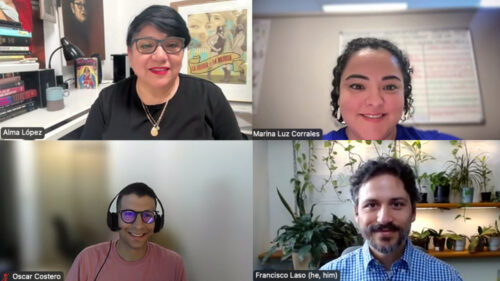To kick off the new academic year, Wiki Education’s Speaker Series will return tomorrow with the webinar “Gen AI and the Wikipedia Assignment: Challenges and Opportunities”!
But before our next discussion begins, we’re taking a moment to look back at the powerful conversation between the four panelists who came together in June to explore the gaps and growth in efforts to expand Latino/x/é and Latin American content on Wikipedia.
“Our students become digital scholar activists.”
For panelist Alma López, a professor and artist, the Wikipedia assignment has become a staple in her courses at UCLA. López’s students have created 128 new Wikipedia articles and enhanced 185 articles in her courses like Chicana Latina Arts and Artists – but when they first begin their projects, her students are often skeptical of Wikipedia as a reliable source of information.
“I always tell students we should question everything, we should always have a healthy paranoia about everything we hear and read, and use our minds to figure it out,” said López, who uses the assignment to examine the concept of knowledge production and representation with her class.
Once they select an artist to add to Wikipedia, the students become investigators and digital scholar activists as they dig into the research process, López explained.
“The Wikipedia project has reshaped my understanding of art, activism, and cultural identity,” said one of López’s students. “I now see art as more than an individual expression. It is a form of storytelling, resistance, and community building that shapes how we understand history and ourselves.”

“Participating in the course with Wiki Education changed my life.”
Fresh off defending her dissertation at Santa Clara University, Marina Luz Corrales joined the panel discussion with a story that highlighted the transformative impact of a Wikipedia assignment – on her own life.
After taking note of her knock-out work on Wikipedia in 2023, Wiki Education featured Corrales’ efforts to create a new article for a prolific Latinx writer, highlighting the first-year EdD student’s aspirations to become an academic librarian.
“The dean of the library saw [the story] and invited me for an interview,” Corrales explained. “That’s where I am now, and actually where I’m conducting my research. Participating in the course with Wiki Education changed my life. And I saw firsthand the importance of Latiné students being able to see themselves on [Wikipedia], because I didn’t see it.”
Corrales emphasized the ripple effect that contributing to public knowledge can have on students through real-world coursework like the Wikipedia assignment.
“Latiné students see a disconnect between using the library and conducting academic research with their lived experiences,” said Corrales. “For instructors and organizations to foster more meaningful participation, I think it’s vital to create learning opportunities that align with students’ cultural and academic identities, encourage students to engage with topics they are passionate about, and show them how their voices can be part of a global conversation.”
“It’s a way of putting perspectives on the map.”
Western Washington University geography professor Francisco Laso integrated a Wikipedia assignment into his course Extractivism and its Alternatives in Latin America for the first time last year. During the panel, he drew a powerful comparison between creating maps and contributing to Wikipedia – both involve choices about visibility and representation.
“There’s the expression in English of ‘putting someone on the map,’” explained Laso. “As a geographer, that’s literally the power one has when creating a map – that you can make visible or invisible entire groups of people depending on what you choose to include on the map, and I think there’s a strong parallel there with what exists on Wikipedia.”
Like López, Laso uses the Wikipedia assignment to engage his students in conversations about how knowledge is created and shared, and the difference their own contributions can make for others.
“Especially in an age of AI where it’s really hard to know what to believe, efforts like Wikipedia are going to be fundamental for people to tell what is true or not,” said Laso. “So really, it’s a way of putting perspectives, stories, and narratives on the map, in people’s consciousness.”
“No one else is going to fill this gap.”
With over two decades in the Wikimedia movement, panelist Oscar Costero drew on his experiences as a founding member of Wikimedia Venezuela, his prior role as the regional ambassador to Latin America for the Wikimedia Foundation, and his work with the WikiLatinos project. Costero, who emigrated from Venezuela to the United States two years ago as a refugee, stressed the importance of engaging Latinx and Latin American communities with improving Wikipedia.
“If we cannot build a presence by people who care about this subject – that have the information but also care about this subject – no one else is going to fill this gap,” said Costero.
Costero explained that improving Latinx and Latin American content on Wikipedia requires not only editing articles, but also contributing photographs, working with libraries, and strengthening the information in Wikidata, one of Wikipedia’s sister projects.
While the scholars brought a wide range of Wikipedia experiences to the discussion, each panelist emphasized a shared message: These content gaps will not close on their own, but everyone has the power to grow a more inclusive and representative body of knowledge for all.
Catch up on our Speaker Series on YouTube:
- Gaps & Growth: Enhancing Latino/x/é and Latin American content on Wikipedia (original English)
- Brechas y crecimiento: Mejorando el contenido latino/x/é y latinoamericano en Wikipedia (Spanish interpretation)
- All Speaker Series recordings on YouTube
Join our next Speaker Series (tomorrow!):
Gen AI and the Wikipedia Assignment: Challenges and Opportunities
Tuesday, August 26, 2025
10 am Pacific / 1 pm Eastern
Registration
Interested in incorporating a Wikipedia assignment into your course? Visit teach.wikiedu.org to learn more about the free resources, digital tools, and staff support that Wiki Education offers to postsecondary instructors in the United States and Canada.
